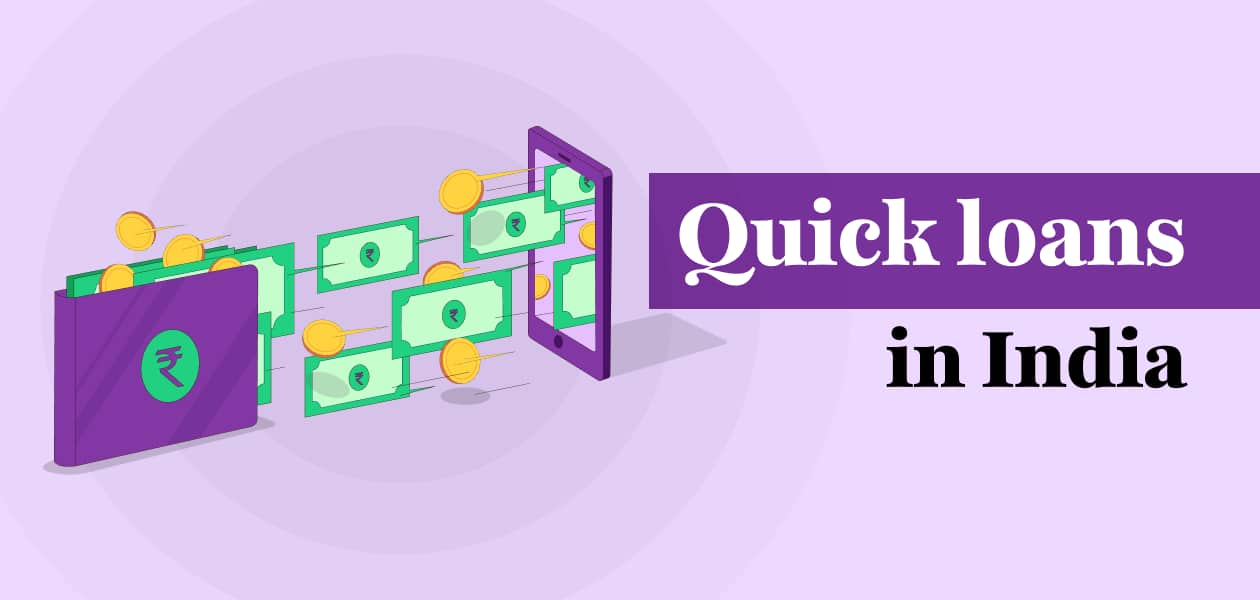In today’s fast-paced world, students often face unexpected financial needs—be it for tuition fees, study materials, hostel expenses, or even personal emergencies. While traditional banks may offer loans, the process can be lengthy and cumbersome. Enter the realm of digital lending, where students can access quick loans with minimal documentation and swift approval processes. This article delves into how students can secure quick loans, the best platforms available, eligibility criteria, and essential precautions to ensure safe borrowing.
Key Takeaways
- Research Before Borrowing: Always compare different platforms to find the best loan terms.
- Understand the Terms: Thoroughly read the loan agreement to avoid surprises.
- Repay on Time: Timely repayments help
n today’s digital age, students are increasingly turning to quick loans to handle unexpected or urgent financial needs. These financial products are designed for speed, simplicity, and accessibility—allowing students to secure funds in a matter of minutes without the lengthy paperwork or formalities typically associated with traditional loans.
Understanding Quick Loans for Students
What Are Quick Loans?

Quick loans, sometimes called instant or personal digital loans, are short-term unsecured loans that do not require any collateral. Unlike traditional loans that may involve long approval timelines and in-person visits, quick loans are offered by modern fintech companies through mobile apps. These apps use technology to assess the borrower’s creditworthiness in real-time and disburse funds quickly, often within the same day.
How Do Quick Loans Work for Students?
Fintech companies have revolutionized lending by focusing on user-friendly, app-based platforms specifically designed for students. These companies understand that many students may not have a strong credit history or a fixed income, so they have created flexible lending models that consider alternative data points—such as educational background, part-time job income, and digital footprint.
A typical loan process for students includes downloading the app, registering, uploading essential documents like Aadhaar card and college ID, selecting the desired loan amount and repayment period, and receiving the loan directly into a bank account after approval.
Key Features of Quick Loans for Students
Instant Approval and Disbursement
One of the biggest advantages of quick loans is the rapid processing time. After submitting your application, many platforms automatically review your profile using AI algorithms and disburse the loan within minutes. This is especially useful in emergency situations, such as paying exam fees, buying books, or covering hostel rent.
Minimal Documentation
Applying for a quick loan doesn’t require piles of paperwork. Most platforms ask for just a few essential documents: your Aadhaar card for identity verification, PAN card for financial history, a college ID to confirm your student status, and sometimes a screenshot or letter confirming enrollment. Some lenders also request basic address proof and bank details for verification and fund disbursement. The process is often entirely digital, including features like selfie or video KYC for added security.
Flexible Loan Amounts
Quick loans are highly adaptable, allowing students to borrow as little as ₹500 for immediate needs or go up to ₹5,00,000 for larger educational or personal expenses, depending on the platform. This flexibility means students aren’t forced into borrowing more than they need, and they can select an amount that aligns with their repayment capacity.
Short-Term Repayment Tenures
Unlike long-term education loans that span several years, quick loans are usually designed for short-term needs. Repayment durations can range from as little as 7 days to a few months. Some platforms also offer repayment in monthly installments. This short duration allows students to repay their loans quickly, minimizing long-term financial burden and interest accumulation.
Additional Benefits of Student-Centric Quick Loans
Beyond the core features, these loans offer several benefits that are uniquely suited to the student demographic:
Tailored for Student Needs
Student-specific platforms like mPokket, StuCred, and Pocketly understand the unpredictable nature of student finances. They design loan products that don’t rely heavily on credit scores and offer smaller, manageable loan amounts.
No Collateral Required
Since quick loans are unsecured, students do not need to pledge any personal assets such as gold, property, or savings to access funds. This reduces stress and encourages young borrowers to manage their finances independently.
Credit Building Opportunity
Timely repayment of quick loans can help students build a healthy credit history, which can be extremely valuable later in life when applying for bigger loans, like car or home loans. For many, this is the first step into formal financial systems.
100% Digital Process
From application to disbursement and repayment, everything is done via mobile app. There’s no need to visit a branch or submit hard copies of documents, making it a convenient solution for the tech-savvy student generation.
When Should Students Consider Quick Loans?
Quick loans can be a helpful financial tool when used wisely. They are particularly suitable for:
- Covering emergency expenses like medical bills or travel
- Paying for exam fees or tuition balances
- Buying laptops or educational tools
- Managing short-term gaps in monthly allowances
- Funding skill-development or online certification courses
However, they are not a substitute for long-term education financing or for frequent use. Students should evaluate whether they can repay the amount comfortably within the loan period before applying.
Top Platforms Offering Quick Loans to Students
CASHe

Overview:
CASHe is a popular digital lending platform that offers personal loans to young professionals and students. The app uses a social loan quotient (SLQ) algorithm to assess creditworthiness.
Loan Details:
- Loan Amount: Up to ₹4,00,000
- Interest Rate: Starts at 2.5% per month
- Repayment Tenure: 90 to 540 days (3 to 18 months)
Eligibility Criteria:
- Indian citizen aged 21 or above
- Minimum monthly income of ₹10,000 (includes part-time or freelance work)
Required Documents:
- Aadhaar Card
- PAN Card
- Proof of enrollment or college ID
- Bank account details and 3-month bank statement
Pros:
- Large loan amounts for high-need students
- Longer repayment duration
- AI-driven credit analysis
Cons:
- Monthly income requirement may not be suitable for all students
- Higher interest rates compared to some student-specific lenders
mPokket
Overview:
mPokket specializes in instant loans to college students and young professionals. It’s designed to help with emergency needs such as exam fees, rent, books, and travel.
Loan Details:
- Loan Amount: ₹500 to ₹45,000
- Interest Rate: Starts at 24% per annum
- Repayment Tenure: Up to 4 months
Eligibility Criteria:
- Indian citizen aged 18 to 50
- Must be enrolled in a recognized college or employed
- Must have a stable source of income (can include internships or side jobs)
Required Documents:
- Aadhaar Card
- PAN Card
- Address proof (utility bill, voter ID, etc.)
- Income proof (if applicable)
- College ID card
Pros:
- Small loans for daily student needs
- Quick disbursal within minutes
- Paperless process
Cons:
- Short repayment window
- Higher annualized interest if repaid late
Pocketly

Overview:
Pocketly is tailored for students and offers flexible short-term credit to help with small, urgent expenses. It provides a credit line that students can use as needed.
Loan Details:
- Loan Amount: ₹1,000 to ₹50,000
- Interest Rate: 1% to 3% per month
- Repayment Tenure: 7 to 120 days
Eligibility Criteria:
- Must be a student enrolled in a college/university
- Should possess a valid college ID and proof of residence
Required Documents:
- Aadhaar Card
- College ID
- Proof of enrollment or admission letter
- Address proof
Pros:
- Student-centric platform
- Small loan options available
- Fast and easy application process
Cons:
- Limited to students only
- Short loan tenure may pressure repayment
Eduvanz
Overview:
Eduvanz focuses on education financing. It partners with educational institutions and training centers to offer customized loans for tuition fees and skill courses.
Loan Details:
- Loan Amount: ₹10,000 to ₹5,00,000
- Interest Rate: 15% to 45% per annum
- Repayment Tenure: Up to 60 months
Eligibility Criteria:
- Must be a student enrolled in a partner or recognized educational institute
- May require co-applicant depending on loan amount
Required Documents:
- Aadhaar Card
- PAN Card
- Proof of admission (admission letter or fee structure)
- College ID card
- Co-applicant documents (if applicable)
Pros:
- Higher loan limits for course fees
- Long repayment periods
- EMI-based repayment structure
Cons:
- May require guarantor or co-signer
- Loan disbursement is typically direct to institution, not student
StuCred

Overview:
StuCred offers instant credit exclusively to students. It’s one of the few platforms offering 0% interest loans to eligible users and promotes financial literacy among students.
Loan Details:
- Loan Amount: ₹1,000 to ₹30,000
- Interest Rate: 0% for select short-term loans
- Repayment Tenure: Up to 90 days
Eligibility Criteria:
- Must be an undergraduate or postgraduate student in India
- Valid college/university ID required
- Age group typically 18–26
Required Documents:
- Aadhaar Card
- College ID
- Proof of enrollment (admission letter or student portal screenshot)
Pros:
- 0% interest options
- Fast approval process
- Student-first user interface
Cons:
- Limited loan amounts
- Only available in select cities/institutions
Step-by-Step Guide to Securing a Quick Loan
Securing a quick loan as a student may seem overwhelming at first, especially if you’re doing it for the first time. However, by following these detailed steps, you can streamline the process and access funds quickly and safely.
Research and Choose a Platform
Why it matters:
Not all lending platforms are created equal. Each platform varies in terms of interest rates, repayment options, eligibility criteria, customer service, and credibility.
Steps to follow:
- Make a list of reliable student loan apps such as CASHe, mPokket, StuCred, Pocketly, and Eduvanz.
- Use filters such as:
- Loan amount needed (e.g., ₹5,000 vs. ₹50,000)
- Repayment period (short-term vs. long-term)
- Interest rates
- Eligibility criteria (college ID, income, location)
- Read online reviews and user testimonials.
- Ensure the app is regulated by the Reserve Bank of India (RBI) or associated with an NBFC (Non-Banking Financial Company).
Pro tip: Choose a lender that offers a grace period or zero-interest option for students when available.
Download the App

Why it matters:
Most modern loan providers operate entirely through mobile apps. They’re user-friendly and streamline the borrowing process from application to disbursement.
Steps to follow:
- Go to the Google Play Store (for Android users) or the Apple App Store (for iOS users).
- Search for the name of the app you chose (e.g., “StuCred” or “mPokket”).
- Make sure the app has:
- High ratings (4.0 stars and above)
- Positive, recent reviews
- Verified publisher details
- Download and install the app on your smartphone.
Pro tip: Avoid downloading from third-party websites to prevent malware or fraudulent versions.
Register and Complete KYC
Why it matters:
KYC (Know Your Customer) is a legal and security requirement. It helps the lender verify your identity and prevent fraud.
Steps to follow:
- Register by entering your basic information:
- Full Name
- Date of Birth
- Mobile Number (linked to Aadhaar)
- Email ID
- Complete KYC by uploading documents:
- Aadhaar Card (for identity)
- PAN Card (for financial verification)
- College ID Card or Proof of Enrollment (to confirm student status)
- Address Proof (if required)
- Bank Account Details (for disbursal and repayment)
- Some apps also use selfie verification or video KYC to confirm identity.
Pro tip: Keep scanned or clear photos of all documents ready beforehand to speed up the process.
Apply for the Loan

Why it matters:
This is the phase where you define the scope of the loan—how much you need and how soon you can repay.
Steps to follow:
- On the app’s dashboard, choose:
- Desired loan amount
- Preferred tenure/repayment period
- Some platforms may conduct a soft credit check, which won’t affect your credit score.
- Review the loan offer, which includes:
- Loan amount
- Processing fees
- Interest rate (APR or monthly)
- Total repayment amount
- EMI schedule (if applicable)
- Click “Apply” or “Confirm” once you agree with the terms.
Pro tip: Avoid taking the maximum offered amount if you don’t need it—you’ll only increase your repayment burden.
Loan Approval and Disbursement
Why it matters:
This is where the lender evaluates your profile and, upon approval, sends the loan directly to your bank account.
Steps to follow:
- Wait for automated processing; many platforms approve within 10–30 minutes.
- If additional verification is needed, customer support may call you.
- Once approved, the money is:
- Directly credited to your linked bank account, or
- Available in your in-app wallet for transfer or usage
Disbursement Timeframes:
- Instant (within minutes): Platforms like mPokket and Pocketly
- Within 24–48 hours: Larger loans on Eduvanz
Pro tip: Keep notifications ON for real-time updates on your loan status.
Repay on Time
Why it matters:
Repayment discipline ensures a healthy credit profile and prevents future borrowing issues.
Steps to follow:
- Review your repayment schedule:
- Lump sum repayment (in 30/60/90 days)
- EMI-based repayment (monthly)
- Set reminders or automate EMI deductions via auto-debit to avoid late fees.
- If possible, repay early to reduce interest (many platforms do not charge prepayment penalties).
- In case of difficulty, contact support for a possible extension or rescheduling.
Pro tip: Timely repayment builds your CIBIL or credit score, which helps in future bigger loans (like education loans, credit cards, or even home loans).
Eligibility Criteria for Quick Loans
While each platform may have its specific requirements, common eligibility criteria include:
- Age: Typically between 18 to 50 years.
- Nationality: Indian citizens.
- Income: A stable source of income; some platforms may require a minimum monthly income.
- Documentation: Valid Aadhaar card, PAN card, college ID, proof of address, and bank statements.
Precautions When Opting for Quick Loans
| Precaution | Why It Matters | Action to Take |
|---|---|---|
| Avoid Unregulated Apps | Unlicensed lenders may misuse your data or engage in harassment | Choose apps regulated by the RBI or linked with certified NBFCs |
| Understand the Terms | Hidden charges and high interest rates can lead to unexpected debt | Read the full loan agreement including APR, late fees, and prepayment terms |
| Repay on Time | Late payments can lower your credit score and increase penalties | Set reminders or enable auto-debit; prioritize loan repayment |
| Borrow Responsibly | Overborrowing can lead to a debt trap and financial stress | Borrow only what you truly need and know you can repay comfortably |
| Avoid Multiple Loans | Multiple loans at once can complicate finances and affect creditworthiness | Stick to one loan at a time unless absolutely necessary |
| Check Reviews & Ratings | Poorly rated apps may have unreliable support or hidden issues | Read app store reviews and user feedback before applying |
| Protect Your Data | Personal documents may be at risk with shady apps | Upload documents only on secure, encrypted platforms |
Also Read : Which Types of Commercial Loans Are Best for Small Businesses?
Conclusion
Quick loans can be a lifesaver for students facing unexpected financial needs. With numerous platforms offering tailored loan products, students can access funds with minimal documentation and swift approval processes. However, it’s crucial to borrow responsibly, understand the terms and conditions, and ensure timely repayments to maintain financial health.
FAQs
1. Can international students in India avail quick loans?
Yes, some platforms may offer loans to international students, provided they meet specific eligibility criteria and have a valid visa.
2. Is a credit score required to avail a quick loan?
Many platforms do not require a credit score, especially for small loan amounts. However, a good credit history can enhance your chances of approval.
3. How quickly can I receive the loan amount?
Depending on the platform, loan disbursement can occur within minutes to a few hours after approval.
4. Are there any hidden charges?
Reputable platforms are transparent about their fees. Always review the loan agreement to ensure there are no hidden charges.
5. Can I repay the loan early?
Most platforms allow early repayment without penalties. However, it’s advisable to check the terms and conditions.
6. What happens if I miss a repayment?
Missing a repayment can lead to penalties, increased interest rates, and a negative impact on your credit score.
7. Can I apply for multiple loans simultaneously?
While it’s possible, applying for multiple loans can affect your creditworthiness. It’s best to borrow responsibly.
